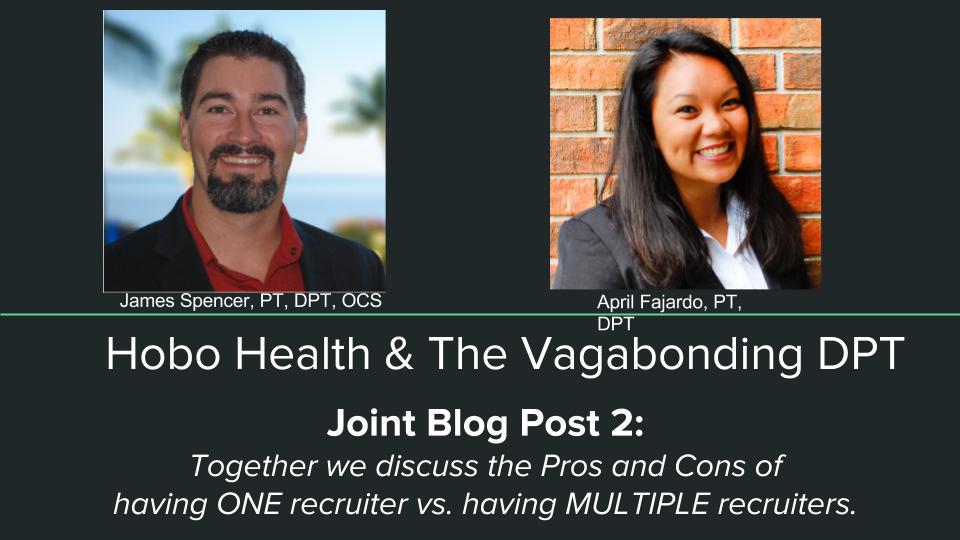 Introduction
Introduction
HoboHealth:
When I first started traveling, I worked with just one company, I had steady health benefits, I would accumulate PTO, and I even got a free wifi printer as a loyalty bonus. The printer was too big to travel with, but I still use it when I have it with me. The company I worked with initially has big name, and they were always able to find me a job. But, when I started looking around, I realized the deal I was getting might not be as good as I thought. Other companies were offering me as much as $200 more per week for similar jobs and seemed a lot more attentive to my needs. $200, that’s one wifi printer per week! That started me down a path of searching with multiple companies about 7 or 8 years ago.
The Vagabonding DPT:
I started traveling about 2 years ago as a new grad. I was fortunate to have a Travel PT mentor who set me up with my current recruiter. Yes, that’s singular. I have one recruiter. I know that the majority have multiple recruiters, but for now, having one recruiter has helped me build my career as a physical therapist. My recruiter is fully aware of my abilities, professional goals, minimum pay rate, and setting preferences. He’s submitted me for positions that I may not “qualify” for (i.e a requirement of 5+ years for a job assignment) because he was confident in my skills and that the position would be a perfect fit for me. Even as a new graduate with my first assignment, I’ve stood firm on negotiation of time off as well as pay rates. I got exactly what I wanted because I had a recruiter who was willing to negotiate those terms on my behalf.
What are the advantages of having one recruiter vs. multiple recruiters?
HoboHealth:
Compare pay rates between companies. It becomes clear very quickly whether what you have been making is competitive with other companies’ rates or not. Knowing what other companies are able to pay you in a given area can be a great negotiating tool if you do decide to stay with just one company.
Different companies have different jobs. You will see many of the same jobs posted across most agencies – the jobs that are the same across agencies are all listed on databases that many facilities contract with to fill their jobs. The databases sell subscriptions to the staffing agencies to have access to their jobs (the databases also charge 3-4% of the total contract price to the recruiters). To beat this system, agencies have gone out of their way to make contracts to exclusively staff particular facilities. So, it is possible that you can’t find a job in a particular area because you aren’t looking with the agency that has an exclusive contract with a facility in the area. Also, some agencies rely solely on what comes across the databases; Other companies are willing to call around for you. All recruiters will say they are willing to canvas an area for you, but less will actually do it (the smaller agencies tend to be more willing to put in the footwork of tracking down novel contracts). Broadening your agencies, may open up additional options.
The Vagabonding DPT:
Each travel company provides different perks the more time you spend with them. The benefits listed below are solely representative of one company:
Paid Time Off: My company provides paid time off for 40 hours after working 2,080 hours and 1 year with them. A travel therapist would be free to cash out that PTO to fill any requested time off during an assignment or in between assignments. From that point thereinafter, you accrue some PTO for every hour you work.
New Grad Bonus: A new grad who works 3 consecutive contracts with this company will earn a $1,000 bonus.
Continuing Education Bonus: When you’ve stayed with this company, you receive $400 of continuing education credit valid also for conferences such as Combined Sections Meeting or NEXT.
Less Paperwork: Every company has a set of protocols that they must follow to be compliant with TJC including BLS certificate, licensing, NPI number, vaccinations, physical exams, TB tests, drug screen and physical examination. In addition, each company will have a mound of paperwork in regards to the company’s policies and procedures about expectations, benefits, clinical competency, etc.
Staying with one company allows you to focus on what you need: less paperwork and more time to invest in your passions and interests.
Health Insurance: If you choose to go with one company and choose to go with their health insurance, you won’t have to worry about switching health insurance companies. Travel PT companies will typically allow you a 30 day grace period in which you will be covered by the company while you’re between assignments.
Consistency: Some larger Travel PT companies will bounce you around with various recruiters who manage a particularly region. If this is the case, then you will have to take the time to let each recruiter know your preferences and want-list.
Do you feel there are any disadvantages to the approach you have taken?
HoboHealth:
The obvious downsides to working with multiple agencies are the benefits you don’t get for being loyal to one agency and the extra paperwork you do get – as April mentioned above.
If you do work with multiple companies, remember this cardinal rule: “You take a particular job with whichever agency offers it to you first.” Meaning, you can’t take an assignment offered by one agency, and tell a different agency about it to try to get a higher pay rate. Things can get sticky fast.
It takes some management to work with multiple companies. At one time, I was searching with 6 or 7 different agencies. One job came up and they had received my resume from multiple different agencies, each claiming I was “their guy”. While I went with the first agency to present the job to me (the only agency who had permission to submit me for the assignment), another agency bullied the facility into only accepting my interview through them. I was unable to go with the agency I liked best and who had presented me the assignment first. It was embarrassing and it’s why I now limit my searches to 2 or 3 agencies. When you are working with multiple agencies, you have to be clear that you need to be contacted before being submitted to a job, otherwise you may end up in my situation with companies bickering over ownership of you with the facility – it’s embarrassing and a good way to blow the interview before you even have it.
The Vagabonding DPT:
As James mentioned above, working with one company requires much trust in one person to provide you with the best pay rate, location, and setting. By doing so, you may limit your options for future possibilities. You must trust that your recruiter is negotiating the terms of your contract to the best of his/her ability to provide you with the best overall package. To decrease this, you could also ask other Travel Therapists about their pay rate for that setting in that specific region.
The same facility may be working with several travel recruiting companies to fill a need. So when you work for multiple companies, you may be offered the same position via two different companies which can actually work against you. In the end, you may not end up with the assignment.
Conclusion
We present you with the advantages/disadvantages to assist you in making the best informed decision for your travel career path. We’ve each done our research to negotiate our contracts. Stay informed and ask around.
This is the second blog HoboHealth and The Vagabonding DPT have done together, you can link here to our first blog together about whether or not to travel as a new grad.
Check out our websites: www.hobohealth.com and www.thevagabondingDPT.org. Follow us on Twitter @HoboHealth and @AprilFajardoDPT. Finally, follow our Facebook Pages to keep up on our latest blogs and what/where we’re up to: HoboHealth and The Vagabonding DPT



 Introduction
Introduction